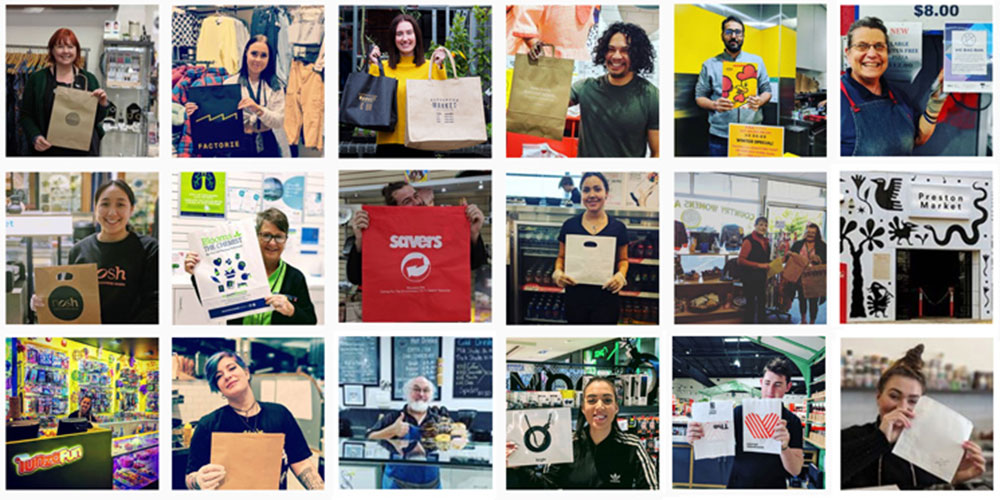Is your business prepared for the bag ban?
The countdown to the state-wide ban on lightweight shopping bags is on. Retailers are preparing for the 1 November deadline. Is your business prepared?
Here’s what you need to know to get ready and make sure your business is compliant.
What is the bag ban?
The Victorian bag ban is simple – any lightweight plastic shopping bags with handles, that are 35 microns or less in thickness at any part of the bag, cannot be handed out or sold whether new or reused. This includes degradable, biodegradable and compostable bags.
While lightweight plastic shopping bags are now banned, you can still use plastic produce bags for unpackaged foods, garbage bags and bin liners, dog waste and nappy bags, and essential product packaging like a bag for a loaf of bread.
The ban is also a good opportunity to explore reusable, recyclable and sustainable options like cardboard bags, cloth bags, non-woven reusable bags and heavyweight reusable bags.
Who does it apply to?
The bag ban applies to all retailers in Victoria. From supermarkets, to greengrocers, clothes stores to pharmacies, restaurants, fast foods, markets and more – if you’re exchanging goods for money, you cannot package those goods in a lightweight plastic shopping bag.
Why is it happening?
Globally, there are about 8 million tonnes of plastic entering the oceans each year – or to put it in perspective, one full garbage truck per minute. In Australia, the main culprit when it comes to litter is plastic. Whether it’s litter or bags that are so light they’ve been blown out of landfill and back into the environment, it’s a massive issue that costs the Victorian Government millions every year to clean. Money better spent elsewhere.

Victorian retailers are ditching plastic bags and sharing their successes to Instagram
What are the penalties for non-compliance?
Retailers caught supplying banned bags or giving false or misleading information about what bags can be used, can incur a fine from approximately $9,900 to $49,500.
Importantly 8,000 submissions were received by the Victorian Government when the ban was still in planning stages, and 96% of respondents were in favour of a ban. That’s pretty overwhelming evidence that Victoria is ready to ban the bag.
Retailers are also very much on board with the change, and some have been plastic bag free for years.
Troy Wheeler of Meatsmith, which has stores in St Kilda and Fitzroy, said that their business banned the bag in 2017, and they haven’t looked back.
“Since 2015 we’ve been wrapping meat in paper and from 2017 we changed to paper carry bags. It’s now a normal part of our offering and customers quite enjoy it.”
Edwina Morgan of Salvos Stores, said that all of their retail outlets had stopped offering plastic shopping bags and are loving it.
“All Salvos Stores changed away from plastic bags and introduced $1 reusable bags close to 10 years ago. Our stores serve customers across different demographics over 348 locations and we’ve had a very positive response overall.”
What should I be doing as a business?
Act now
Run down your current supply of banned bags as much as possible before the deadline. From 1 November, they’re out of bounds so the fewer you have lying around, the better. Any leftover bags can be recycled at your local soft plastic recycler.
Get alternatives in stock
Firstly, consider whether you need a bag at all. How many of your customers buy just one or two items? How many customers drive up to your store and jump straight in their cars – do they really need a bag? Are you located near a supermarket that has already ceased offering free bags – most people visiting these stores are bringing their own bags already, so do you need to offer bags anymore? How much would you save per year if you stopped giving out free bags?
If you do need to offer a bag, consider more sustainable options like cloth, jute or thick reusable options. The more likely a bag is to be reused, the less likely it will end up in litter or landfill. Have you considered using bags made from recycled materials. Many food outlets moved to recycled paper years ago.
Should you charge for a bag?
Bag fees are totally your decision, but it can be a great opportunity for retailers.
We all know that alternative bags are more expensive. Since major supermarkets and thousands of retailers moved to bag fee models, consumers have come to expect a small charge if they forget their own bag.
Retailers from other states with a ban in place who charge for bags report up to 90% drops in bag volume, which is helpful for you, and the environment!
National Retail Association research confirms that 96% of customers are willing to pay for a bag if they forget their own. They’re also happier to wear the cost if the alternative bags are truly reusable or recyclable, rather than just thicker plastic.
Let everyone know!
Spread the word to your customers, friends and families. The NRA has signage available for free – just print it out and stick it up!
The National Retail Association has spent the last 6 months travelling all over Victoria, visiting 180 locations, engaging over 13,000 retailers to provide assistance and advice regarding the ban. They’ve also created the vicbagban.com.au website with all the information you need, lots of free resources like signs for your store and factsheets, and even a tollfree hotline (1800 817 723) just for businesses with questions about the ban.